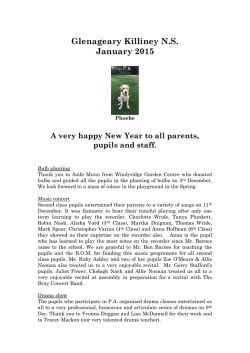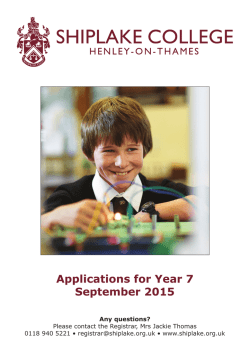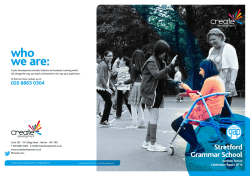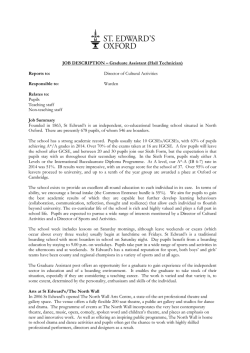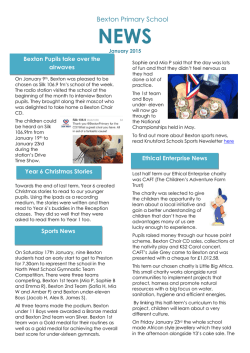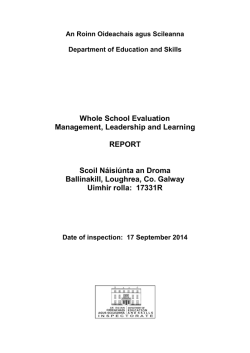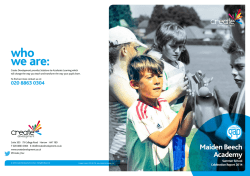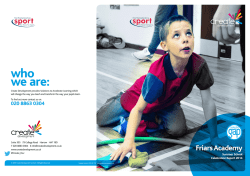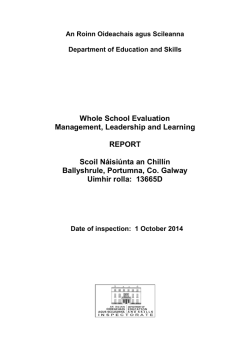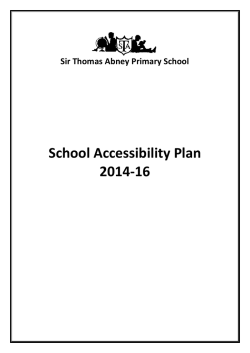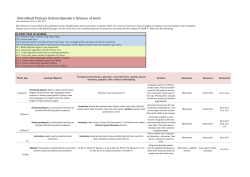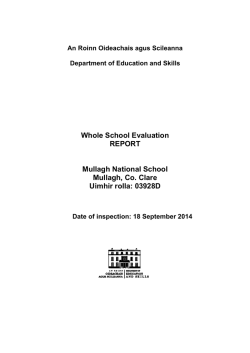
Whole School Evaluation Management, Leadership and Learning
An Roinn Oideachais agus Scileanna Department of Education and Skills Whole School Evaluation Management, Leadership and Learning REPORT Scoil Mhuire, Horeswood, Campile, Co. Wexford Uimhir rolla: 19604N Date of inspection: 16 October 2014 Whole-School Evaluation – Management, Leadership and Learning Report Introduction A Whole-School Evaluation – Management, Leadership and Learning (WSE - MLL) was undertaken in Scoil Mhuire in 2014. This report is based on a selection of lessons observed in a range of learning settings in the school, interaction with pupils and review of their work, meetings with the principal and with board and parent representatives, completed parent and pupil questionnaires, and a selection of school documents. The board of management was given an opportunity to comment in writing on the findings and recommendations of the report, and the response of the board will be found in the appendix of this report. There are 302 pupils enrolled and the attendance of almost all pupils is very good. The school has strengths in the following areas: • • • • • • • The board of management is praised for its support of the school, in particular its work in relation to the recent classroom refurbishments, upkeep of the school building and its ongoing commitment to the ongoing professional development of staff. The quality of the classrooms’ environments is excellent. Classrooms are stimulating, colourful and print-rich with many displays of pupils’ work celebrated in a range of curriculum areas. Pupils are very well-behaved and are positively disposed to their lessons and learning. The overall standard of their achievement is high. The principal supported by her in-school management team provides praiseworthy leadership to the school. She has successfully led the introduction of a wide range of curriculum initiatives and her well-developed organisational skills ensure that the school is operated in an efficient and successful manner. The overall quality of teaching across the school is commendable. Teachers inspire high levels of interest, effort and application in the pupils and readily embrace new teaching approaches in advancing the quality of learning experiences for pupils. A very good range of resources for teaching and learning is provided and purposefully used by teachers. Parents provide valuable support to various school activities. The following main recommendations are made: • • It is recommended that current arrangements for provision in relation to special educational needs in the learning support setting be reviewed to ensure that pupils with the greatest learning needs receive suitably differentiated support. The board of management should issue an annual report on the operation of the school. Findings 1. The learning achievements of pupils • The overall learning achievements of pupils are high and the results of standardised testing indicate good levels of attainment in literacy and numeracy. Pupils experience a broad and balanced curriculum and are well motivated to learn. There is evidence of good active collaborative learning and pupils’ independent learning skills are well developed. • Achievement in numeracy is of a very good standard and most pupils demonstrate a competent understanding of the mathematical concepts being taught. In the main the quality of pupil achievement in English and Irish is high. Most pupils express themselves confidently and articulately. They read with appropriate fluency and accuracy and demonstrate overall positive attitudes to reading. Pupils produce writing of high quality across the genres. The implementation of school-wide initiatives to improve comprehension in English and mathematical problem-solving is praised. In addition to pupils’ achievements in literacy and numeracy, noteworthy learning achievements are in evidence in Social, Environmental and Scientific Education, the Visual Arts, Physical Education and Music. • Good progress is also recorded in relation to the work of the pupils with additional learning needs. 2. Quality of teaching • The overall quality of teaching across the school is commendable. In the parent questionnaires the overwhelming majority of parents agree that teaching is good in the school. Teachers inspire high levels of interest, effort and application in the pupils and readily embrace new teaching approaches in advancing the quality of learning experiences for pupils. A variety of methodologies is used effectively including questioning, discussion, teacher modelling, drama, language games and collaborative group and pair work. Teachers use a wide range of resources to introduce new concepts and reinforce learning. There is very good practice in relation to the use of Information and Communications Technology (ICT) across a number of curriculum areas. Teachers are commended for the excellent classroom environments. Classrooms are stimulating, colourful and print-rich with many displays of pupils’ work celebrated in a range of curriculum areas. • There is very good assessment practice at the school. Summative testing is used frequently and is supported by the use of teacher-designed tests and checklists to assess attainment in literacy and numeracy and other curriculum areas. A detailed analysis of the outcomes of standardised assessment has taken place. The planned introduction of the self-assessment folders and the increased use of formative feedback to pupils will further enhance assessment practice. 3. Support for pupils’ well-being • Teachers develop a very good rapport with their pupils. A positive code of behaviour is in place which is reflected in the management of the pupils in the classrooms. Pupil questionnaires indicate that pupils enjoy school and think that this is a good school. • Staff at the school are very committed to meeting the care and learning needs of all pupils. The school has a wide variety of structures in place to meet a broad range of learning needs. Pupils are withdrawn both individually and in groups, through in-class support for literacy and numeracy and through withdrawal of whole-class units. It is recommended that current arrangements be reviewed to ensure that pupils with the greatest learning needs receive appropriate differentiated support. • Lessons in support settings are carefully structured and effective teaching strategies are used. Teachers prepare detailed individual plans and use these to inform their programmes of learning. It is important to ensure that in all settings the targets contained in the individual plans are directly related to the specific learning needs of the pupils and are reviewed regularly. Pupils participate well in sessions and are achieving positive learning outcomes. • The parents’ association (PA) works diligently to support school activities through fund-raising and the organisation of a variety of school-related activities. In discussion, the PA representatives strongly endorsed all aspects of school provision. In the questionnaires almost all parents indicated that they felt welcome in the school, that their children were doing well and that overall they were happy with the school. • Confirmation was provided that the board of management has formally adopted the Child Protection Procedures for Primary and Post-Primary Schools without modification and that the school is compliant with the requirements of the Child Protection Procedures for Primary and Post-Primary Schools. 4. Leadership and Management • The board of management is praised for its support of the school, in particular its work in relation to the recent classroom refurbishments, upkeep of the school building and its ongoing commitment to the ongoing professional development of staff. Parent responses to the questionnaires reflect a • desire for greater communication regarding the work of the board. The board should consider the collation and publication of an annual report. The principal provides praiseworthy leadership to the school. She approaches her work in a highly professional manner and manages the school in an efficient, capable and strategic way. Her empowering and reflective leadership style supports the introduction of a wide range of teaching and learning initiatives. Teachers’ skills are nurtured purposefully and continuous professional development (CPD) is encouraged. She is ably supported by the in-school management team who attend to their duties conscientiously. The willingness of other member of staff to undertake additional roles and responsibilities is acknowledged. 5. School Self-evaluation • The school has engaged well in school self-evaluation (SSE) of literacy and numeracy using evidence collected from pupils, parents, analysis of standardised tests as well as on teacher reflections and observations. A number of whole-school approaches have been agreed and it is evident that they are being implemented consistently on a whole-school basis and are having a positive impact on classroom practice. Conclusion Given the commitment of school staff to delivering a high quality programme of learning for pupils, their participation in ongoing professional development and their willingness to adopt new teaching approaches and initiatives, the school’s capacity to develop further is very good. Published January 2015 Appendix School response to the report Submitted by the Board of Management Area 1: Observations on the content of the inspection report Re.Main recommendation 1:. We appreciate and understand the advice given in SET as it relates to senior learning support groups. We have already acted on the advice given and changes are in place. Re: Recommendation 2: The BOM would like to note that it agrees on release of information to parents for inclusion in the school’s monthly newsletter at its meetings. Area 2: Follow-up actions planned or undertaken since the completion of the inspection activity to implement the findings and recommendations of the inspection Learning support groups in 5th and 6th have been changed to target greatest need and are working well. The school’s RSE policy is now included in the Enrolment pack as a number of parents were not familiar with it.
© Copyright 2026
